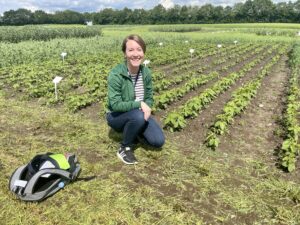By ACN Future Ag Communicators Committee Chairwoman Megan Schilling
In the past week, I’ve traded fields of corn and soybeans for rolling hills of spinach and Kentucky Bluegrass. I’ve toured biogas facilities, university research plots, farm supply coops, and organic and seed crop farms. I’ve met agriculture journalists from Australia to Ireland, and all of this I’ve done in Denmark.
As I started my journey to the International Federation of Ag Journalists Congress, I was eager to learn what has made agriculture so successful in an environment unfamiliar to my own.
I knew to expect a highly innovative and sophisticated agricultural system. Denmark, somewhere between Maryland and West Virginia in size, is 2/3 agriculture land with around 33,000 farms and 9,000 professional farmers who grow cereal crops and raise livestock.
What I didn’t expect was the striking number of similarities to U.S. agriculture, and many reasons to keep up with the current events in the country.
Some of the first similarities I found on a farm run by two brothers and fourth generation farmers, Michael and Johan Levy. The Levy brothers’ farm is over 1,700 acres of arable land with about 150 acres of forest. They grow seed crops, including bluegrass, spinach, barley, wheat, beets, rapeseed, peas, and more.
Farmers in Denmark adhere to a regulation to plant 30% of farmland to cover crops, and so the Levys do. The regulation is part of many initiatives that help keep the country sustainable. According to the Danish Food and Ag Council, the ag sector has cut emissions by 17% since 1990 and has increased crop production by 31%.

ACN Member Megan Schilling poses in front of the Ausumgaard farm,
which has had a grass protein biorefinery since 2015.
Schilling was last year’s Andy Markwart Horizon Award winner.
She used the scholarship to attend this year’s IFAJ Congress in Denmark.
(Courtesy: Megan Schilling)
The diverse rotation of seed crops and covers have helped maintained the land’s good condition and have led to high and stable yields.
It’s picturesque, but like any farm, there are challenges.
Land is so expensive to keep up that every single square meter (or, foot for us Americans) must be cultivated and the inputs calculated meticulously.
Precision spraying and GPS allows them to maximize their crop production as they seek to be profitable. “Technology makes the business interesting,” Johan says. “I think there will be robot technology in the future and new tech that will fly over the fields to spot weeds.”
To follow the government’s cover crop guidelines, the Levys must harvest the cash crop and plant the mandated cover crops in quick succession, sometimes cutting it very close to the planting deadline, especially if weather isn’t in their favor.
In addition, a carbon tax on the agricultural and transportation sectors is expected this fall, which should push the country further towards its goal of reducing carbon emissions by 70% (based on data from 1990) by 2030. However, not much is known about how the tax will work and how much it’s going to cost the family farmer.
Soren Sondergaard, chairman of the Danish Agriculture & Food Council and a fifth-generation farmer, is not optimistic about the tax.
“Six months from now, we will have a political discussion,” Sondergaard says. “Denmark would be one of the first countries in the world to implement such a tax. We keep telling the politicians to give us some peace to solve the emissions targets we set for 2030. With a tax, we may not have the revenue to do it.”
Reflection
On the day I visited the Levy farm, Johan said, “I only borrow this land. I want to leave it better for the next generation.”
It’s a sentiment I’ve heard dozens of times. While I was wowed by technology and sustainability during my week in Denmark, I was also humbled and reminded that farming is farming no matter where you are.
As farmers, you put your faith and trust in factors beyond your control, you seek to secure a future for your family, and you feed the world while working to leave it in a better condition than you found it. I’m proud of my own farming roots and the legacy I am part of at Successful Farming that allows me to contribute in my own way to such a vital global industry.

Megan Schilling is a digital content editor for Meredith Agrimedia.

